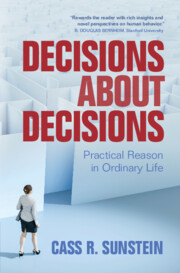Book contents
- Decisions about Decisions
- Decisions about Decisions
- Copyright page
- Contents
- Tables
- Preface
- 1 Second-Order Decisions
- 2 Deciding to Opt
- 3 Deciding to Know
- 4 Deciding to Believe, 1
- 5 Deciding to Believe, 2
- 6 Deciding Inconsistently
- 7 Deciding to Consume, 1
- 8 Deciding to Consume, 2
- 9 Deciding by Algorithm
- 10 Deciding for Oneself
- Epilogue “Get Drunk!”
- Acknowledgments
- Index
2 - Deciding to Opt
Published online by Cambridge University Press: 29 June 2023
- Decisions about Decisions
- Decisions about Decisions
- Copyright page
- Contents
- Tables
- Preface
- 1 Second-Order Decisions
- 2 Deciding to Opt
- 3 Deciding to Know
- 4 Deciding to Believe, 1
- 5 Deciding to Believe, 2
- 6 Deciding Inconsistently
- 7 Deciding to Consume, 1
- 8 Deciding to Consume, 2
- 9 Deciding by Algorithm
- 10 Deciding for Oneself
- Epilogue “Get Drunk!”
- Acknowledgments
- Index
Summary
What do people care about? Psychological work on well-being has long emphasized (1) happiness, sometimes described as “pleasure,” and (2) eudaimonia, sometimes described as “flourishing” and associated with a sense of purpose or meaning. More recent work has explored (3) “psychological richness,” understood to call for a diversity of experiences and perspectives, including experiences that challenge and alter one’s preferences and values. This work is directly relevant to certain admittedly rare decisions that might alter our “core” – our conception of our identity and what we care most about. As examples, consider a decision to become a monk, to change one’s nationality, to have a child, or to get divorced. “Opting” situations raise serious challenges for decision theory, because one’s preferences and values cannot be held constant. If people’s preferences would be different depending on whether they opt, which choice is best? The right choice, I suggest, requires a shift from preference satisfaction to welfare. To decide whether to opt, people must ask: What would make their lives better? That question immediately leads to another one: What is the right conception of welfare? That might be a hard question, but it is the correct one; pleasure, purpose, and psychological richness are relevant to the answer.
- Type
- Chapter
- Information
- Decisions about DecisionsPractical Reason in Ordinary Life, pp. 33 - 43Publisher: Cambridge University PressPrint publication year: 2023

